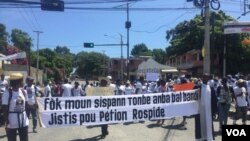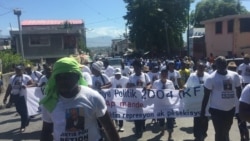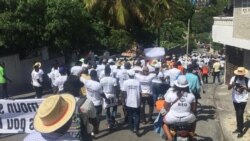Hundreds of journalists wearing white T-shirts participated in a silent march Sunday to demand justice for their murdered colleague.
“Haiti’s citizens must be protected!” a representative of the Civilian Protection Office group said. “If things had changed after Vladjmir Legagneur (a journalist who died while reporting on gang activity in 2018) went missing, Douz would be alive today. Justice for Douz!”
Petion Rospide, whose nickname was Douz, worked as a radio host for RSF (Radio Sans Fin) in the Haitian capital, Port-au-Prince. He was shot and killed as he made his way home after reporting on anti-corruption protests on June 10. Earlier in the day, angry protesters had targeted vehicles belonging to Radio-Tele Guinen, a popular station seen and heard nationwide and a former VOA Creole affiliate.
News vans and cars belonging to staff were set on fire, sending employees scrambling to put fires out before firemen and police arrived on the scene to help.
Reporters Without Borders tweeted it’s concern about the safety of Haiti’s journalists after hearing about the murder.
Journalist shot dead amid anti-government protests in #Haitihttps://t.co/6K5j0JOTsq
— RSF in English (@RSF_en) June 11, 2019
It is unclear if Rospide’s killing was connected to his reporting on the protests. His colleague Joseph Obenson, who addressed the crowd at the end of the march in front of the Ministry of Justice building, offered his own theory.
“We stand in front of the Ministry of Justice today to ask that it do its job because before Douz was assassinated last Monday, he was speaking in front of the ministry building,” Obenson said. “He was demanding justice for the citizens who were shot and killed during the protests. He was demanding justice for the poor people who were massacred in La Saline. He was demanding justice for the residents of Tokyo (a slum in Port-au-Prince), Delmas 2, and other slums and especially those who live on the southern coast of the capital whose lives (seem to be) worthless (to the authorities).”
The journalist called on the Justice Ministry to publish its findings about what happened to reporter Vladjimir Legagneur and to bring to justice those targeting citizens for political reasons.
The National Police force, PNH, launched an investigation into Legagneur’s disappearance and made several arrests. However a year later, no official report has been published and what exactly happened to him remains a mystery.
“Justice for Douz! Justice for Douz!” the crowd shouted as the march ended.






